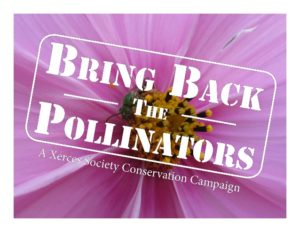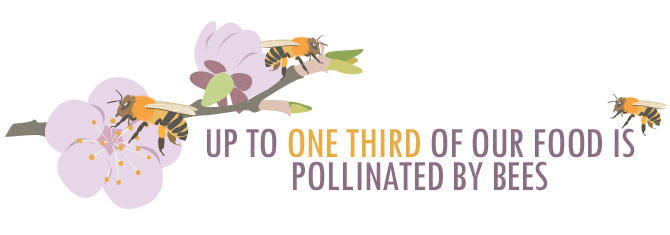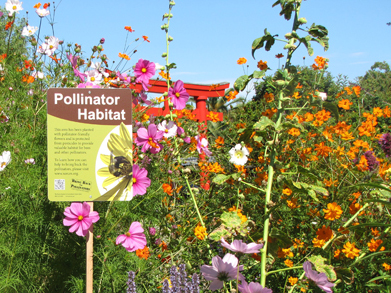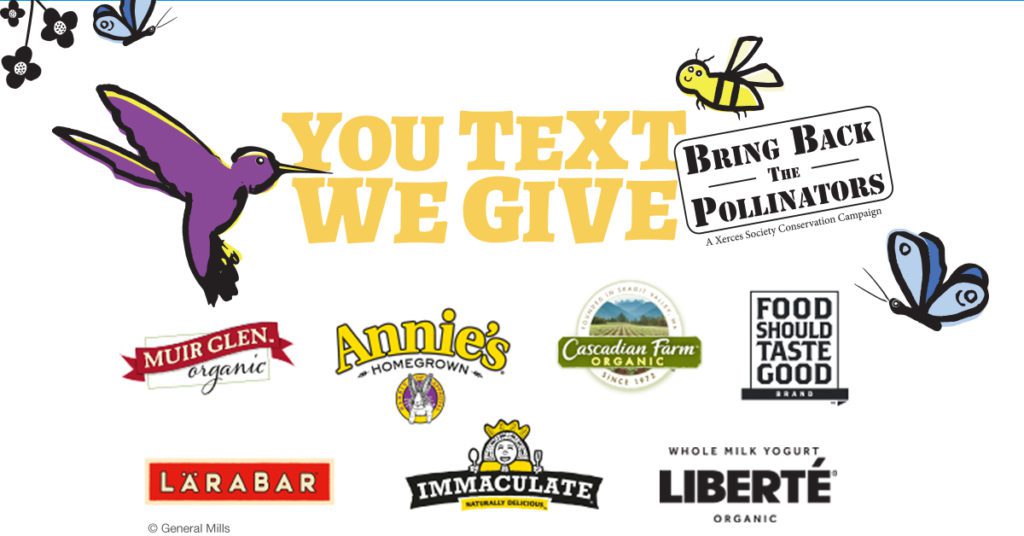Excerpted from The Pollinator Partnership and The Xerces Society
 The Buzz on Pollination
The Buzz on Pollination
Pollination occurs when pollen is moved within flowers or carried from flower to flower by pollinating animals such as birds, bees, bats, butterflies, moths, beetles, or other animals, or by the wind. The transfer of pollen in and between flowers of the same species leads to fertilization, and successful seed and fruit production for plants. Pollination ensures that a plant will produce full-bodied fruit and a full set of viable seeds.
Pollinators Provide
Pollinators are essential to our environment. The ecological service they provide is necessary for the reproduction of over 85% of the world’s flowering plants, including more than two-thirds of the world’s crop species. The United States alone grows more than 100 crops that either need or benefit from pollinators, and the economic value of these native pollinators is estimated at $3 billion per year in the U.S. Beyond agriculture, pollinators are keystone species in most terrestrial ecosystems. Fruits and seeds derived from insect pollination are a major part of the diet of approximately 25% of all birds, and of mammals ranging from red-backed voles to grizzly bears. In many places, the essential service of pollination is at risk from habitat loss, pesticide use, and introduced diseases.
- Worldwide, roughly 1,000 plants grown for food, beverages, fibers, spices, and medicines need to be pollinated by animals in order to produce the goods on which we depend.
- Foods and beverages produced with the help of pollinators include: apples, blueberries, chocolate, coffee, melons, peaches, potatoes, pumpkins, vanilla, almonds, and tequila.
- In the United States, pollination by honey bees, native bees, and other insects produces $40 billion worth of products annually.

To learn more about the Xerces Society’s Pollinator Conservation Program, please click here to download a summary of their work. For even more information, read the 2016 Bring Back the Pollinators Report.
Pollinators in Trouble
- Worldwide there is disturbing evidence that pollinating animals have suffered from loss of habitat, chemical misuse, introduced and invasive plan and animal species, and diseases and parasites.
- Many pollinators are federally “listed species,” meaning that there is evidence of their disappearance in natural areas.
- The U.S. has lost over 50% of its managed honeybee colonies over the past 10 years.
- A lack of research has hindered our knowledge about the status of pollinators. The E.U. has been so concerned that they have invested over $20 million investigating the status of pollinators in Europe.
 Ways to Protect our Pollinators
Ways to Protect our Pollinators
- Flowers provide the nectar and pollen resources that pollinators feed on. Growing the right flowers, shrubs, and trees with overlapping bloom times will support pollinators from spring through fall.
- A home for growing pollinators is essential. You can leave patches of bare ground and brush piles or install nesting blocks, and plant caterpillar host plants. For region specific information, visit the Pollinator Conservation Resource Center.
- Give bees a chance with the Bee Friendly Initiative, a research initiative backed by the one and only Paul Stamets of Host Defense. Early research shows that mushrooms can have a positive impact on the health of pollinators and have us asking, “Could the mushroom save the honeybee?” Watch this video and find out!
- Pesticides are harmful to pollinators, especially insecticides. Herbicides reduce food sources by removing flowers from the landscape.
- Let your friends and neighbors know you’re providing habitat with a pollinator habitat sign. You can also sign the Pollinator Protection Pledge and join thousands of others who have pledged to provide habitat and protect pollinators from pesticides. If you have a garden in the United States, it will also be automatically added to the National Pollinator Garden Network – a part of the Million Pollinator Garden Challenge.
- Buy food that has been grown organically or without the use of harmful pesticides. You will improve your health, the pollinator’s survival and the planet’s well-being!
- Get involved in the You Text We Give Pollinator Event during the month of April, 2017. Small Planet Foods and Harvest Market encourage our shoppers to help bring back the pollinators by texting WEGIVE to 411247. There is absolutely no cost to you, yet there is a huge gain to protecting pollinators through a donation to the Xerces Society for Invertebrate Conservation, which Harvest Market proudly supports. Your personal information will not be collected (we asked).

